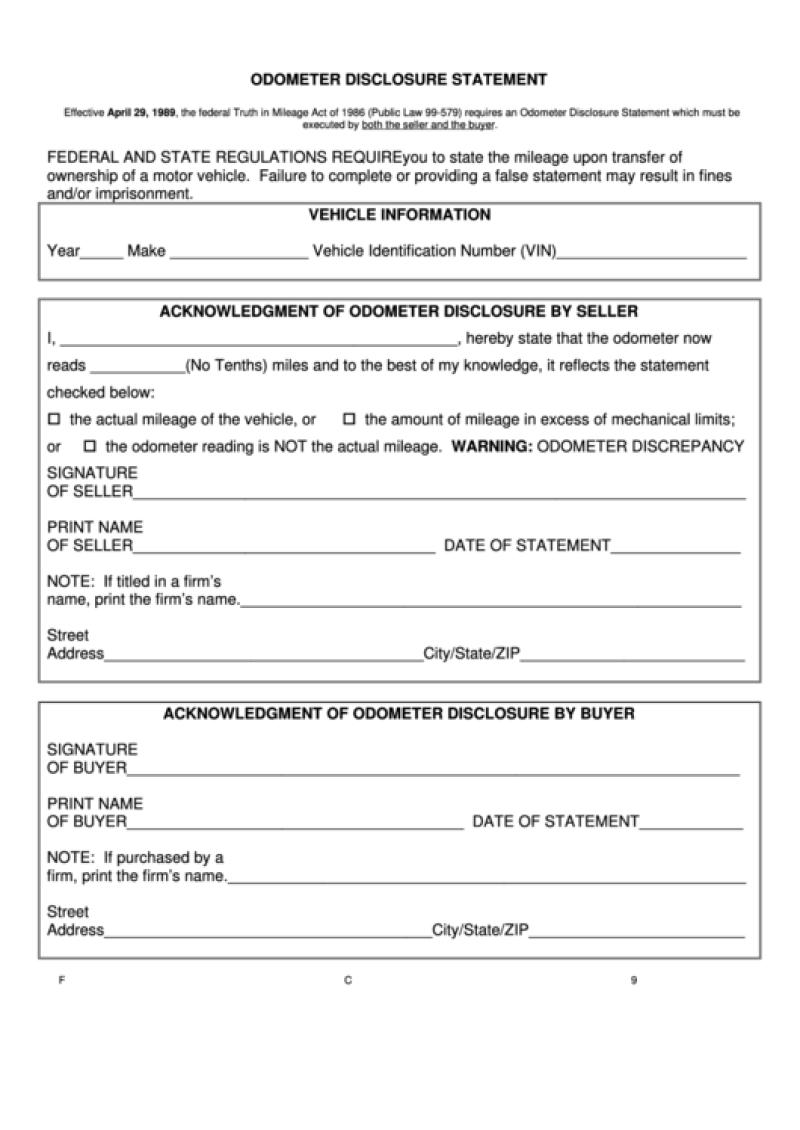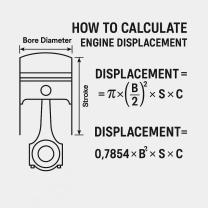What is an odometer disclosure statement?
An odometer disclosure statement is a legal document that provides information about the mileage of a vehicle. It is used in the process of transferring ownership of a motor vehicle, typically during the sale or transfer of a car from one party to another. The statement is designed to prevent odometer fraud and ensure that the buyer is aware of the accurate mileage on the vehicle.
The key components of an odometer disclosure statement include:
Vehicle Information:
- Year, make, model, and vehicle identification number (VIN) of the vehicle.
Odometer Reading:
- The current mileage on the vehicle's odometer at the time of the transfer.
Date of Disclosure:
- The date when the odometer reading is disclosed.
Seller's Declaration:
- A statement in which the seller declares the accuracy of the odometer reading to the best of their knowledge and acknowledges any discrepancies or changes in mileage.
Buyer's Acknowledgment:
- A space for the buyer to acknowledge receipt of the odometer disclosure statement and to confirm that they understand the mileage information provided.
The odometer disclosure statement is a crucial component of the vehicle title transfer process in many jurisdictions. It helps to protect buyers from unknowingly purchasing a vehicle with a rolled-back odometer or inaccurate mileage. Odometer fraud involves altering the mileage on a vehicle to make it appear less used than it actually is, potentially leading to the buyer paying more for the vehicle than its true value.
When selling a vehicle, the seller is generally required to provide an accurate odometer reading and sign the disclosure statement. Failure to disclose accurate mileage or engaging in odometer fraud can have legal consequences, including fines and penalties.
It's important for both buyers and sellers to carefully review and complete the odometer disclosure statement during the vehicle transfer process. Additionally, buyers should consider obtaining a vehicle history report to cross-verify the odometer reading and gather additional information about the vehicle's past.
What is an odometer disclosure statement, and why is it important?
An odometer disclosure statement is a legal document that discloses the mileage of a vehicle at the time of sale or transfer of ownership. It is important because it helps to protect buyers from odometer fraud, which is the practice of tampering with a vehicle's odometer to make it appear to have fewer miles than it actually does.
Odometer disclosure statements are required by law in most countries, including the United States. In the US, the odometer disclosure requirement is governed by the Motor Vehicle Information and Cost Savings Act (MVCSA).
How does an odometer disclosure statement contribute to the sale of a vehicle?
An odometer disclosure statement can contribute to the sale of a vehicle in a number of ways. First, it helps to build trust between the buyer and seller. By providing an accurate odometer disclosure statement, the seller is demonstrating that they are honest and transparent. This can make the buyer more likely to purchase the vehicle.
Second, an odometer disclosure statement can help the buyer to determine the value of the vehicle. The mileage of a vehicle is a major factor in its value. By knowing the mileage, the buyer can be sure that they are paying a fair price for the vehicle.
Third, an odometer disclosure statement can help the buyer to make an informed decision about whether or not to purchase the vehicle. The mileage of a vehicle can give the buyer an idea of its condition and how much maintenance it will require. For example, a vehicle with high mileage may be more likely to need repairs sooner than a vehicle with low mileage.
3. Are there legal implications for failing to provide an accurate odometer disclosure statement?
Yes, there are legal implications for failing to provide an accurate odometer disclosure statement. In the US, it is a federal crime to tamper with a vehicle's odometer or to fail to provide an accurate odometer disclosure statement. Sellers can be held criminally and civilly liable for odometer fraud.
Buyers who have been victims of odometer fraud may be entitled to compensation, including the difference between the actual value of the vehicle and the price they paid for it.
In addition to the legal implications, failing to provide an accurate odometer disclosure statement can also damage the seller's reputation. If a buyer discovers that the seller has provided an inaccurate odometer disclosure statement, they are less likely to trust the seller in the future. This can make it more difficult for the seller to sell other vehicles.
Overall, it is important for sellers to provide accurate odometer disclosure statements. This helps to protect buyers from odometer fraud and builds trust between the buyer and seller.













